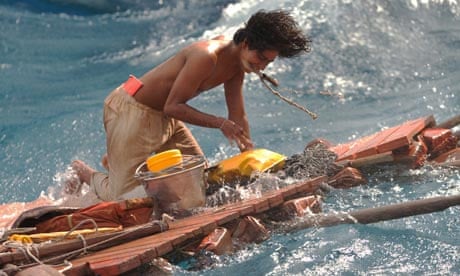While everyone waits for the Producer's Guild awards to let us know which way the winds for best picture are blowing, a couple of thermals at the weekend gave more shape to the best director race.
On Saturday, the London Critics Circle film awards gave out their annual gongs: to Amour for film and best actress, to The Master for the performances of Phillip Seymour Hoffman and Joaquin's Phoenix, while best director went to Ang Lee. This, on the same weekend that Life of Pi held off The Hobbit at the international box office for the second week running.
While everyone has been distracted by the Argo-Lincoln wrestling match, Life of Pi has been quietly amassing close on half a billion – superhero numbers. How many adaptations of French-Canadian literary novels about Pantheism can you say that about?
Traditionally, it is the domestic box office that has the greater impact on the Oscars race; international success is usually the sign of a Batman or a Transformers. But Life of Pi's overseas action isn't going unnoticed in Hollywood, which is increasingly watered with foreign cash. In 2009, the studios earned a whopping 70% of their money abroad, and while North America is still the largest territory, it won't be for long: China is expected to eclipse it in 2019.
If you think that hasn't had an impact at the Oscars already look at the winners from the last few years: the Bollywood hybrid Slumdog Millionaire in 2009, the very British The King's Speech and France's The Artist in 2011.
"I'm not American and I'm not French, actually," Michel Hazanavicius told the DGA when he accepted his directing award for The Artist last year. "I'm a film-maker." Hollywood movies have less claim on being an art form indigenous to North America than at any point in their history. Hollywood is now the world's jukebox.
That's why I was so excited by the Life of Pi's awards prospects when I saw it back in September at the New York film festival. The film squares many circles for Hollywood, bringing A-list lustre to the 3D phenomenon and the "four-quadrant" family film, a genre which drives Hollywood right now – think Dr Seuss' The Lorax and Madagascar 3 – but offers little in the way of awards-season prestige. It offers a bridge between Hollywood's past and future, marrying the storytelling of The Jungle Book to the cutting-edge technology of Avatar. While James Cameron's film was the first king of this new world order, Lee can have some credit for its pre-genesis. His 2000 film Crouching Tiger, Hidden Dragon played midwife to the genre: a huge international hit, of mixed east-west parentage, marrying cutting-edge special effects to traditional storytelling.
Earlier this year, Oscarologists handicapped Life of Pi as "destined for the Hugo slot: f/x-driven, sentimentally involving, respected director" – but Hugo was a cold marvel, not sentimentally involving enough. It scored highly with film critics but failed to enchant the children at whom it was aimed. Lee has immersed himself in 3D technology as fully as Scorsese, but without muffling the heartbeat of his tale. As David Edelstein put it:
It turns out Lee has more affinity for Pi the yarn-spinner than for any of his other heroes. His movies (Lust, Caution; Crouching Tiger, Hidden Dragon; Hulk; Brokeback Mountain; Taking Woodstock) center on emotions that can't be suppressed and finally burst forth – but the meticulousness of his framing and color-coordination (or that mythical cowboy iconography in Brokeback Mountain) make his work seem one step removed, as if in a terrarium. In Life of Pi, he finally has a story in which that very distance is the source of the emotion. Pi has designed his own terrarium to keep from staring directly into the abyss. It's not denial. It's faith in something else: the transformative power of storytelling. The film is transcendent.
It's clearly popular with the Academy, garnering 11 nominations, second only to Spielberg's Lincoln, which is still the film to beat for best picture, but as a directing vehicle, it has a crucial flaw: most critics have praised Spielberg for what he does not do. There are few battle scenes, little rousing oratory, no sentimental scenes in which freed slaves thank an overwhelmed Lincoln and little heard from John Williams and his angelic choirs. It is, in short, the director's least Spielbergian picture. He's on a self-imposed diet. This may please his detractors, but I'm not sure such self-effacement makes for a convincing best director win.
With no Affleck or Bigelow to contend with, this leaves best director up for grabs. Barring a sweep by Silver Linings Playbook – we'll know more about whether that's possible when the Sag awards get handed out – it looks as if Life if Pi could take home more than just cinematography and special effects. I think Lee both could and should win his second best director Oscar.

Comments (…)
Sign in or create your Guardian account to join the discussion